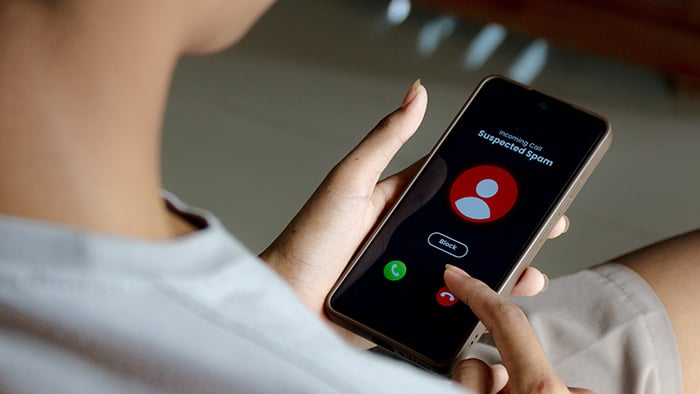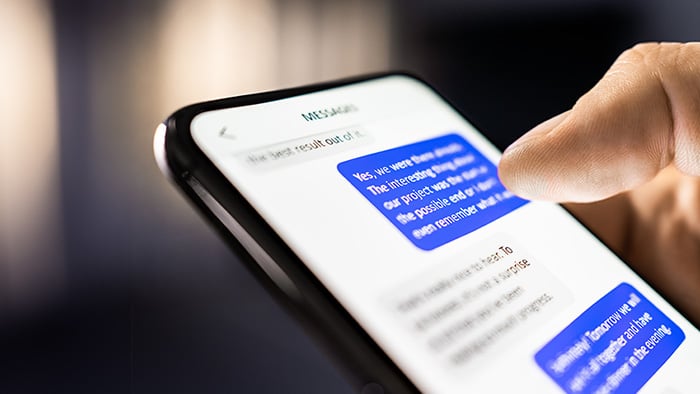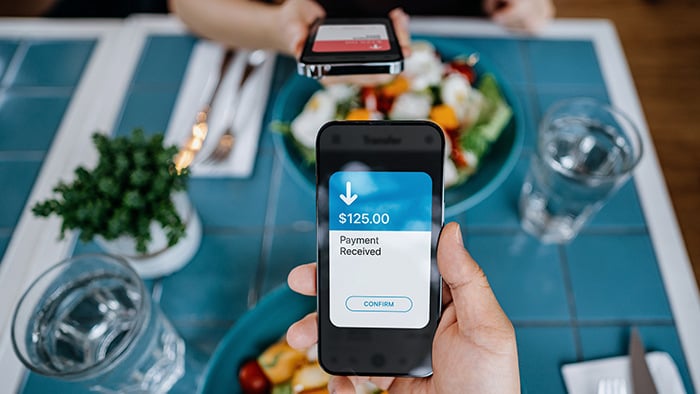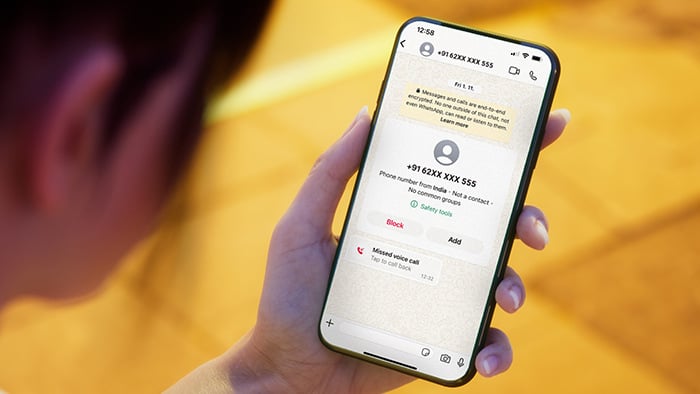Is Facebook Marketplace safe?
Facebook Marketplace is generally safe if you follow best practices like avoiding off-platform payments, verifying buyer and seller profiles, and understanding Facebook’s payment protection policy. It also has built-in safety features to help protect users, such as buyer and seller ratings and fraud reporting tools.
However, like all online marketplaces, Facebook Marketplace can’t completely protect users against fraudsters. Criminals may use the platform in scams designed to steal money or personal information from victims, with common approaches including fake listings, payment tricks, and phishing schemes.
Common Facebook Marketplace scams
Facebook Marketplace scams aim to exploit the trust of Facebook users, leveraging the platform’s informal nature. Many of them are social engineering scams that trick buyers or sellers into sharing personal details or login credentials over the built-in messaging service.
Other common threats include fake product scams and a variety of payment scams that often rely on extracting money via external payment platforms that aren’t covered under Facebook’s payment protection policy.
Click below to jump straight to the scam type you want to learn more about:
According to an FTC report, one in four people who reported losing money to fraud since 2021 said the scam began on social media. However, fraudulent schemes that start on Facebook Marketplace may extend to other platforms like WhatsApp or third-party payment apps.
Social engineering scams
Social engineering scams on Facebook Marketplace aim to manipulate users into revealing sensitive information or making unsafe transactions. Scammers may pose as buyers, sellers, or even one of your Facebook friends, using fake urgency, emotional appeals, and phishing links to steal sensitive data like login credentials or payment information.
These are examples of some of the most common social engineering scams you might encounter on Facebook Marketplace.
Sense of urgency scams
Many scammers try to create a sense of urgency to pressure you into making decisions quickly before you have time to consider the risks. On Facebook Marketplace, scammers may pose as eager buyers or sellers, claiming they need immediate payment or a fast response. They might insist on unsafe payment methods or send fake verification links.
These are some common urgency tactics used by scammers on Facebook Marketplace:
-
Limited time offers: Scammers claim the item you’ve enquired about is available at a discount for a limited time, encouraging you to act right away.
-
Immediate payment requests: Scammers ask you to make partial payment via a wire transfer, often claiming it’s required as a deposit to secure the item.
-
Exaggerated threats: Scammers say another buyer is just about to make an offer, urging you to act immediately to secure the deal.
 Scammers may use a variety of tricks to get you to act quickly.
Scammers may use a variety of tricks to get you to act quickly.
Phishing
Phishing is a form of social engineering where cybercriminals trick victims into revealing sensitive information, such as login credentials or payment details. On Facebook Marketplace, scammers may pose as reputable sellers or well-known brands to gain your trust and lure you into clicking malicious links or sharing private data, often under the guise of a legitimate transaction.
Scammers might carry out the entire scheme from within Facebook Marketplace’s messaging feature, or encourage you to continue communicating on an external website or app.
Here are some key phishing tactics used by Facebook Marketplace scammers:
-
Unsolicited messages: Scammers may contact you directly, posing as buyers or sellers and sending messages containing links to unsafe websites, fake payment requests, or urgent or emotional appeals designed to encourage you to share personal information.
-
Comments on Marketplace listings: Fraudsters may post comments on your listings, encouraging you to move conversations off the platform, and sometimes even containing suspicious links that could install malware on your device.
-
Fake seller profiles: Scammers can create fake seller profiles to advertise non-existent or counterfeit products. Their bios may contain phishing links disguised as payment pages or shipping information.
Verification code scams
In verification code scams, fraudsters try to access your Facebook or payment app accounts by convincing you to share a verification code sent to your phone or email. They may pose as buyers, sellers, or even impersonate Facebook, claiming the code is needed to “verify your identity” or “complete a transaction.”
Here are some key signs of verification code scams on Facebook Marketplace:
-
Unexpected requests for codes: You receive a message or notification asking you for a verification code, even though you didn’t request any account verification or security updates.
-
Facebook impersonation: Scammers often pose as representatives from Facebook or claim they need to verify your identity for security reasons. They may ask you to send the code to them directly.
-
Pressure to act quickly: Scammers might urge you to share the code immediately, creating a sense of urgency or implying that your account or transaction will be compromised if you wait.
Once you provide the code to a scammer, they might use it to hack your account or confirm transactions they initiate, aiming to steal money or personal information they can use in further account takeover attacks or even identity theft.
If you ever receive an unexpected request for a verification code, don’t comply. If you’re ever in doubt, double-check if the request is legitimate through official Facebook channels.
QR code scams
QR code scams trick you into scanning malicious QR codes that allow them to steal money, personal information, or Facebook login credentials. Scammers often pose as buyers or sellers, urging you to scan a QR code to “verify” a payment or complete a transaction. These codes typically redirect you to a fake website designed to harvest sensitive data — or worse, trigger unauthorized payments via PayPal, Venmo, or cryptocurrency platforms.
Here are some ways QR codes may be used in Facebook Marketplace scams:
-
Fake payment confirmations: A scammer posing as a buyer claims they’ve already paid for a product they purchased from you and sends a QR code to "confirm the transfer", but scanning it withdraws money from your account.
-
Fake Facebook verification: A scammer sends a QR code to you via a messaging app, but scanning it leads to a fake Facebook login page that aims to trick you into entering your login credentials so the scammer can hijack your account.
-
Order tracking scams: A scammer pretending to be a seller provides a QR code, claiming it will allow you to track the delivery of an item you’ve bought. The code instead leads to a phishing site that aims to steal your payment details.
Fake giveaway
A fake giveaway scam tricks you into believing you have won a free item, prize, or exclusive deal on Facebook Marketplace. Scammers will use these phony giveaways to steal your personal information by asking you for information to “claim your prize” so that they can then hack into your Facebook account, get your personal information, or trick you into paying hidden fees.
 Giveaways that seem too good to be true are often scams.
Giveaways that seem too good to be true are often scams.
Fake giveaway scams on Facebook Marketplace typically involve high-value items that are rarely given away for free, like smartphones or gaming consoles. They’ll generally use urgency tactics to pressure you into acting fast before the “offer” expires.
Remember, legitimate giveaways will typically be held by reputable brands with positive online reviews, won’t ask for sensitive information to claim your prize, and shouldn’t encourage you to click suspicious links to collect the item.
Fake product scams
Fake product scams on Facebook Marketplace involve fraudsters listing counterfeit, stolen, or non-existent items to deceive buyers. They will try to lure you in with low prices, but demand an upfront payment made on a third-party payment platform to “secure” the item before disappearing with your money.
What the experts say
"Victims seeking... medications online risk purchasing counterfeit or contaminated products, exposing themselves to financial fraud and identity theft."
Proceeding with risky off-platform purchases means you won’t be covered by Facebook’s buyer protection. To stay safe, always use trusted, on-platform payment methods and avoid deals that push for off-platform communication or payment.
Car scams
Some scammers create fake or misleading car listings on Facebook Marketplace to lure buyers into making large upfront payments for vehicles that don’t exist. They may also try to collect personal information, like your driver’s license number, under the guise of “verifying” your identity. These tactics can lead to financial loss and even identity theft.
 Facebook Marketplace scammers may list the same car for sale in multiple locations.
Facebook Marketplace scammers may list the same car for sale in multiple locations.
Common types of car scams on Facebook Marketplace include:
-
Car deposit scams: Some scammers ask you to send a deposit for a car before seeing the vehicle, but once you’ve paid, the scammer and the vehicle listing disappear.
-
Stolen vehicles ads: Scammers can sell stolen cars on Facebook Marketplace for quick cash, often using fake documents. If you buy one, you risk losing money and the vehicle, as stolen cars can be confiscated by authorities.
-
Phantom car listings: A scammer lists a car that doesn’t exist for sale, using stock, AI-generated, or stolen images, aiming to attract a buyer and collect money or personal information before vanishing.
-
Title-washing scams: Scammers might sell cars with hidden damage (e.g., flood-damaged or salvaged vehicles) by lying about the vehicle’s history or condition in the Marketplace description.
To stay safe, always verify the seller, inspect the car in person, check the vehicle history, and avoid making hefty upfront payments.
Property scams
Property sale and rental scams on Facebook Marketplace involve fraudsters posing as landlords, realtors, or property owners to trick buyers or renters into paying deposits or rent for homes that either don’t exist or aren’t actually available. These scams exploit the urgency of housing demand by pressuring victims to send money quickly — often before they’ve had a chance to verify the listing.
Scammers may steal photos from legitimate listings and repost them at lower prices to attract attention, claiming they can only offer “virtual tours” rather than in-person viewings. Some even go as far as creating fake leases or forged ownership documents to make the scam seem credible.
To avoid falling victim, never make payments without first visiting the property in person. Always verify the identity of the landlord or agent through official channels before sharing personal or financial information.
Shipping scams
Shipping scams on Facebook Marketplace often involve fake sellers tacking on bogus shipping fees or demanding payment for items that never arrive. In another variation, scammers pose as buyers and offer to purchase your item, on the condition that you use their suggested shipping service. Once you pay the supposed shipping company, the buyer vanishes and the deal falls through.
Common red flags of shipping scams on Facebook Marketplace include the buyer or seller:
-
Refusing local pickup and insisting on shipping the item at cost.
-
Providing fake tracking numbers that don’t work or lead to fraudulent websites.
-
Requesting to use unauthorized third-party shipping services.
 Be wary of sellers and buyers who request third-party pickups and send suspicious links.
Be wary of sellers and buyers who request third-party pickups and send suspicious links.
Remember, Facebook Marketplace does not support third-party payment systems or shipping services outside its authorized partners (USPS, UPS, and FedEx). Be cautious of anyone suggesting unsupported delivery methods, as they may be part of a scam or an unreliable transaction process.
False advertising
Some scammers exploit Facebook Marketplace by misrepresenting products or services to trick you into paying for items that are fake, low-quality, or don’t exist at all. They may use stolen images, misleading videos, or deceptive descriptions to make the listing appear legitimate, often paired with prices that seem too good to be true.
Once you show interest, the scammer may pressure you into using unsafe payment methods like wire transfers or gift cards, which are nearly impossible to trace or recover. To avoid these traps, steer clear of deals that seem suspiciously cheap, verify the seller’s credibility, and always use secure, trackable payment options.
Here are some examples of common fake products you might see on Facebook Marketplace:
-
Broken or fake electronics: High-end electronics, like vacuums or phones, may be counterfeit or broken. Beyond not being what you paid for, they can pose serious safety hazards, such as electrical malfunctions or fire risks.
-
Fake cosmetics: Knock-off beauty products like teeth whitening or anti-wrinkle treatments on Facebook Marketplace may contain diluted or contaminated ingredients, but be repackaged as “premium brands.” Scammers profit from high-volume sales, while buyers risk adverse reactions.
-
Counterfeit luxury items: Scammers might sell fake luxury goods (e.g., handbags, watches, or collectibles) that appear legitimate but are cheaply made knock-offs.
Stolen item scams
Stolen item scams on Facebook Marketplace involve criminals selling high-value goods — like electronics, bikes, or tools — at steep discounts to quickly offload stolen property. Buyers may unknowingly purchase these items, risking financial loss and potential legal trouble. These listings often lack packaging, accessories, or receipts, and sellers may give vague or evasive explanations.
Scammers target Facebook Marketplace because it’s easy to remain anonymous, and there’s strong demand for secondhand deals without ownership verification. To stay safe, ask detailed questions, verify the item’s history, and be cautious of rushed sales or prices that seem too good to be true.
Faulty product
Scammers can use Facebook Marketplace to sell a faulty product that they know is defective or damaged, but hide its true condition in the listing. The goal is to deceive buyers into thinking they’re getting a fully functional product.
Scammers often use stock images or strategically angled photos to conceal defects while falsely claiming the item is in “excellent” or “like new” condition. They may refuse to provide a video demonstration or let you test the product before purchase. Once the deal is done, the scammer might block you to avoid refund requests or negative reviews.
Payment scams
Although Facebook Marketplace offers built-in payment features through Facebook Pay or Meta Pay, scammers often exploit the lack of payment options to trick buyers or sellers into losing money through external fraudulent transactions. Common payment scams include overpaying and refund scams, wire transfer fraud, and reversed payments via external cash apps.
Overpayment
An overpayment scam occurs when a scammer posing as a buyer intentionally sends more money than the agreed price and asks for a refund of the excess. Once the seller refunds the difference, the scammer cancels or disputes the original payment, leaving the seller with no money and potentially out of both the item and the refund.
On Facebook Marketplace, scammers often use Messenger or third-party payment apps to request a refund, claiming they’ve overpaid. They may apply pressure, insisting the refund is urgent. To avoid this, use Facebook’s official checkout system, cancel partial payments, and ask the buyer to resend the correct full amount before proceeding.
Wire transfers
Unlike PayPal or credit card transactions, wire transfers — electronic transfers of money between bank accounts — cannot be reversed once sent. Facebook Marketplace also does not support wire transfers directly, meaning your dispute and reporting options are limited.
Scammers may ask you to pay via wire transfer with no intention of delivering the item, or they might use it to sell counterfeit or faulty products, knowing it will be difficult for you to recover your money. To stay safe, avoid using wire transfers and stick to secure, traceable payment methods approved by Facebook Marketplace.
Reversed payment
A reverse payment scam happens when a scammer uses a fake check, stolen credit card, or compromised account to pay for your item. Once you’ve shipped or handed over the product, the payment is reversed, leaving you with no money and no item. In some cases, you may even be charged fees for bounced checks or chargebacks.
Sellers of high-value items like vehicles, electronics, or furniture are common targets, especially if they accept checks or third-party app payments without verifying the buyer. To protect yourself, avoid accepting unverified payment methods and consider using secure, platform-approved payment options whenever possible.
Payment app scams
Payment app scams on Facebook Marketplace involve fraudsters tricking buyers or sellers into sending money through external payment applications before they reverse, dispute, or disappear with the funds before transaction completion.
This is also a common scam on Venmo, Zelle, Cash App, PayPal, and other payment platforms. Since these cash apps process payments instantly, recovering your lost money is nearly impossible.
 Be wary of sellers who will only accept payment through cash apps.
Be wary of sellers who will only accept payment through cash apps.
A buyer may send a fake screenshot showing a completed payment via a payment app, pressuring you to hand over the item before checking your account. Some scammers may sell items on Facebook Marketplace and insist on app payments before shipping, then disappear without sending anything.
Unlike PayPal, which has both buyer protection and seller protection policies, Cash App, Venmo, and Zelle offer very little in the way of robust purchase or sale protection, leaving you vulnerable to scams carried out on Facebook Marketplace or other online stores.
Gift card
Gift card scammers pressure you to pay with gift cards instead of secure, traceable methods. They favor gift cards because, like cash, once the code is redeemed, the funds are nearly impossible to track or recover. If someone asks you to complete a transaction using gift cards, it’s almost certainly a scam — walk away immediately.
Gift card scams can operate in various ways on Facebook Marketplace. Here are some examples:
-
Sellers insist on gift card payment: A scammer demands payment via gift cards (for Amazon, Apple, Google Play, e.g.) instead of through a secure payment platform, before vanishing without delivering the item you purchased.
-
Fake gift cards or a gift card with a low balance for sale: Scammers may offer gift cards that are either overpriced or completely drained of value. You won’t discover the card is worthless until after it’s delivered — by which point the scammer has likely vanished.
-
Refund request via gift card: A scammer may ask for a refund for a product you sold in the form of a gift card instead of a bank transfer. However, the original payment may then get detected as fraud and reversed, leaving you out of pocket.
Signs of a Facebook Marketplace scam
Facebook Marketplace scams come in many forms, but most share a few common red flags. Be cautious of unusually low prices on high-value items, sellers who dodge in-person meetings or won’t provide proof the item works, and anyone who tries to move the conversation off Facebook Messenger to platforms like email or WhatsApp.
Here’s a more detailed look at the main signs that you might be dealing with a Facebook Marketplace scam:
-
Suspiciously low prices for high-value items (cars, electronics, etc.).
-
The seller refuses to meet in person or provide proof of the item's condition.
-
A buyer or seller moves the conversation off Facebook Messenger or requests your phone number.
-
The buyer claims to have overpaid and requests a refund of the difference.
-
You're asked to send the item before receiving payment.
-
The seller profile lacks a photo, ratings, and reviews, or has little activity.
-
Requests for payment via gift card, check, a third-party payment app, or wire transfer instead of secure, supported methods.
How to avoid scams on Facebook Marketplace
To stay safe and avoid scams while using Facebook Marketplace, it’s crucial to take precautionary measures, such as enabling two-factor authentication (2FA) on your account, verifying buyers and sellers through their profiles and reviews, and avoiding deals that seem too good to be true.
Enable 2FA on Facebook
Enabling two-factor authentication (2FA) on your Facebook account helps prevent scammers from hijacking it, even if they obtain your password. They won’t be able to log in without a second verification step, such as a code sent to your phone. It’s an effective way to reduce the risk of a scammer taking over your profile and impersonating you to scam your Facebook friends or other Marketplace users.
Facebook offers several 2FA options, including verification codes sent via text message, an authentication app, email, or Facebook app notifications.
Here’s how to enable 2FA on the Facebook app:
-
Open Facebook, tap the three lines in the top right, and go to Settings & Privacy > Settings > Account Center > Password and security.
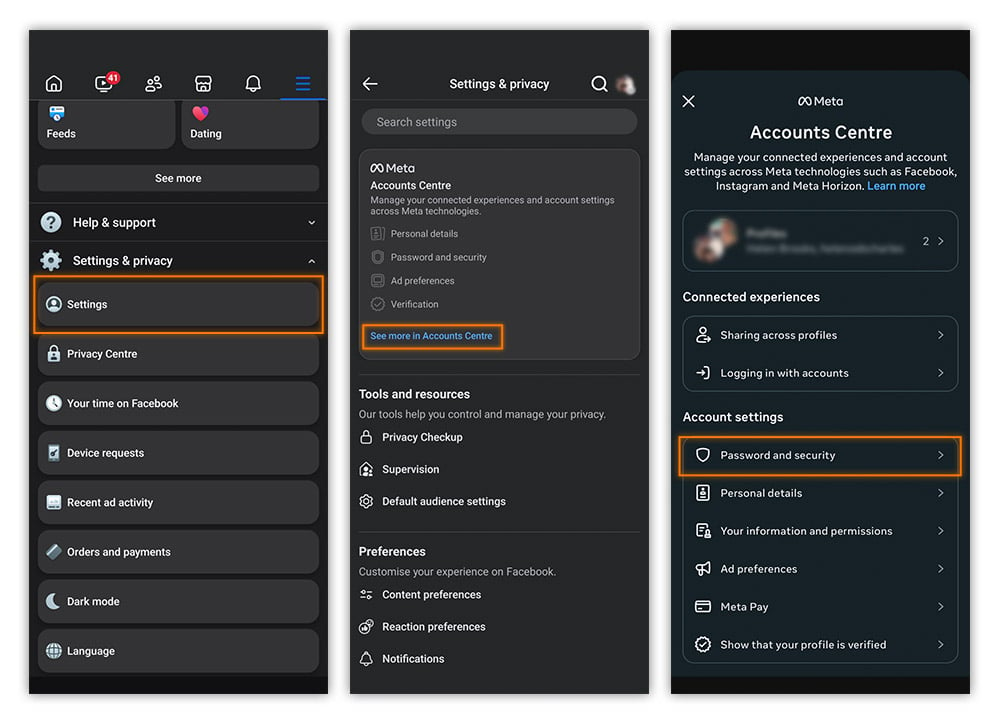
-
Tap Two-factor authentication, select your Facebook account, and choose your preferred 2FA method.
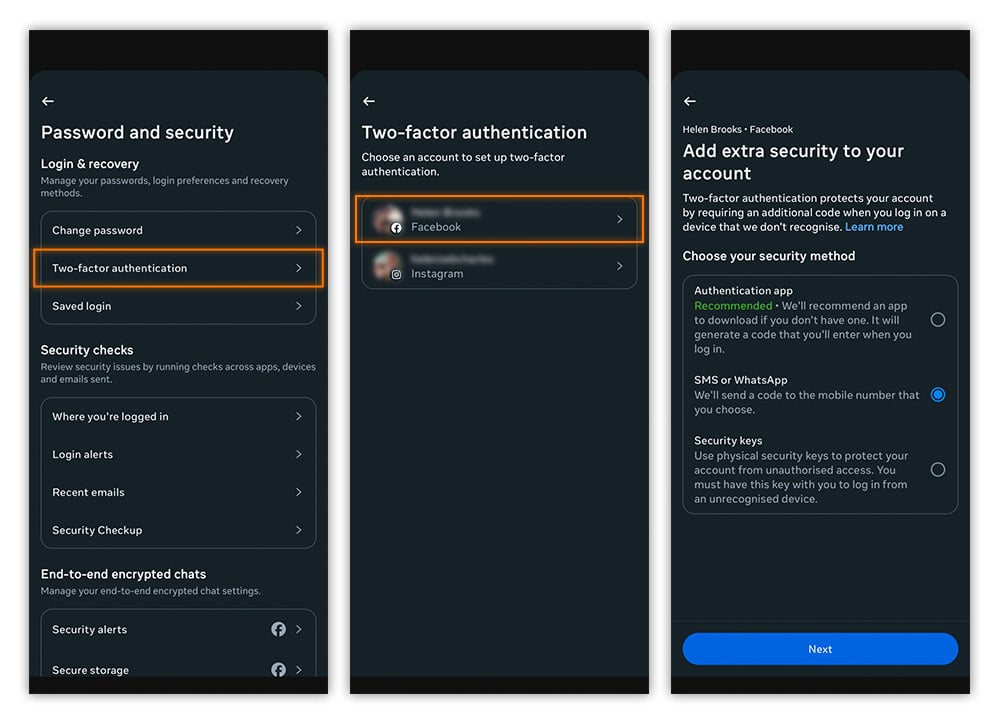
-
Enter the code provided via your chosen method, tap Next, enter your password, if prompted, and then tap Done.
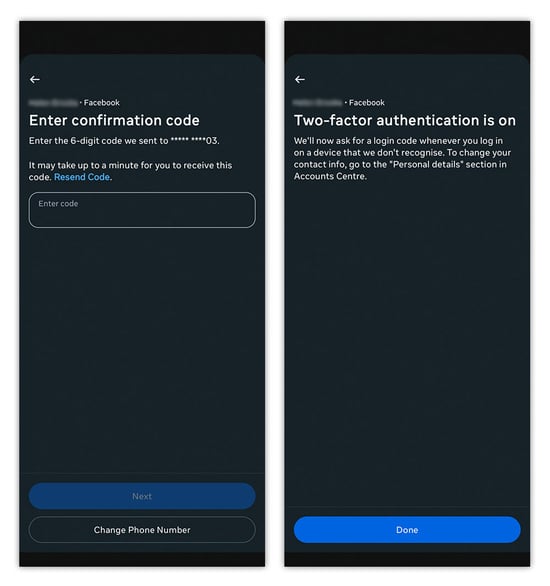
Now, each time you log in, you’ll need to provide an additional code, enhancing your account's security and helping prevent Facebook hacks and scams.
Update your privacy settings
When you list an item or post a comment on Facebook Marketplace, your profile will be linked for sellers and buyers to view. By updating your privacy settings on Facebook, you can limit who can view your private information. This helps to reduce scam risks on the Marketplace as well as boost your account security. Without this precaution, scammers may be able to exploit your details to commit fraud, steal your identity, or manipulate you into a scam.
Here’s how to hide your private information from Facebook Marketplace users:
-
Open the Facebook app and tap the three horizontal lines > your profile picture > Edit Profile.
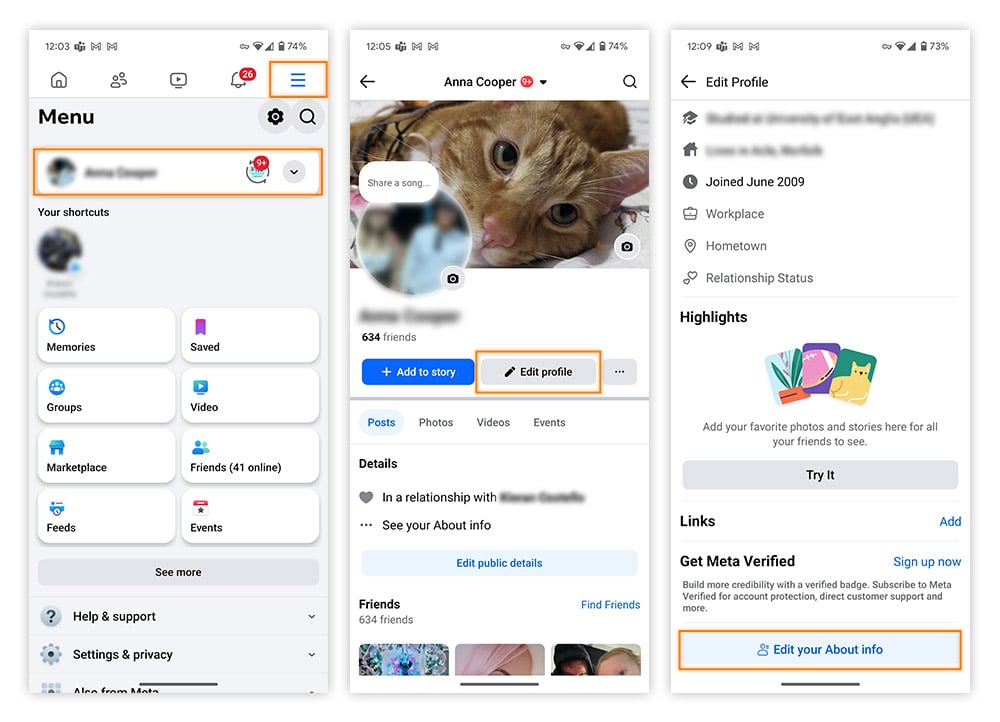
-
Tap Edit your About info and then tap the pencil next to any information you want to hide on your profile (e.g., your contact information). Tap Share with, select Only me, and then Save to update your preferences.
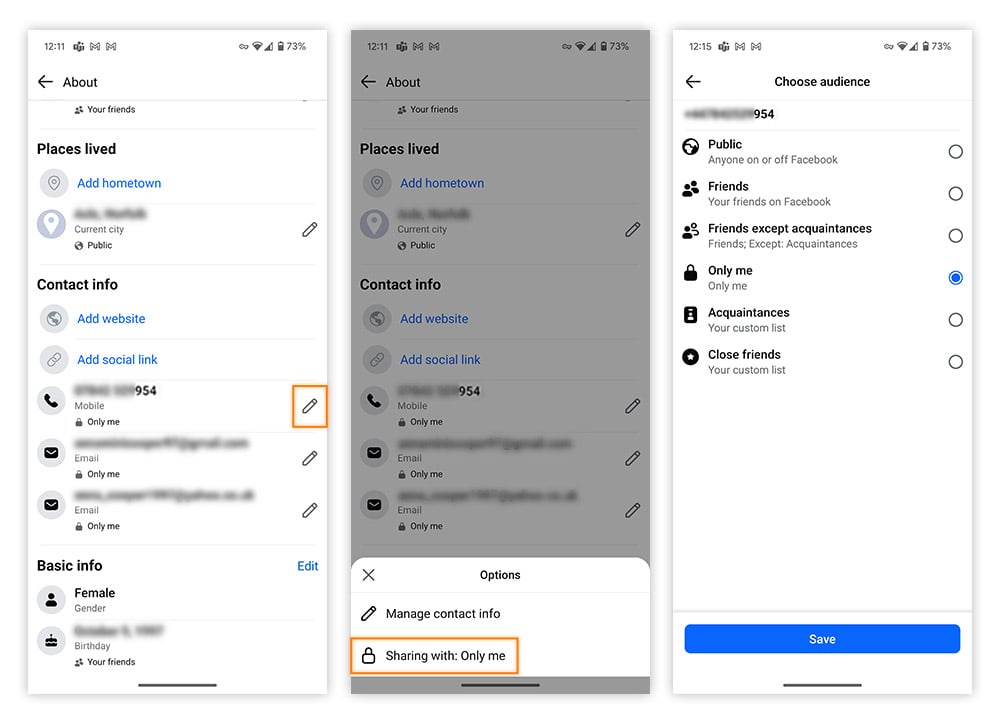
You should also avoid sharing sensitive information like your phone number, home or work address, bank details, or credit card info in your Marketplace listings or messages with a potential buyer or seller.
Block scammers on Facebook
If you’re contacted by a suspicious Facebook user, you can block their profile to avoid them getting in touch again.
To block a scammer on the Facebook app:
-
Tap the three horizontal lines on the main menu, followed by the settings cog > Audience and visibility > Blocking > Add To Blocked List.
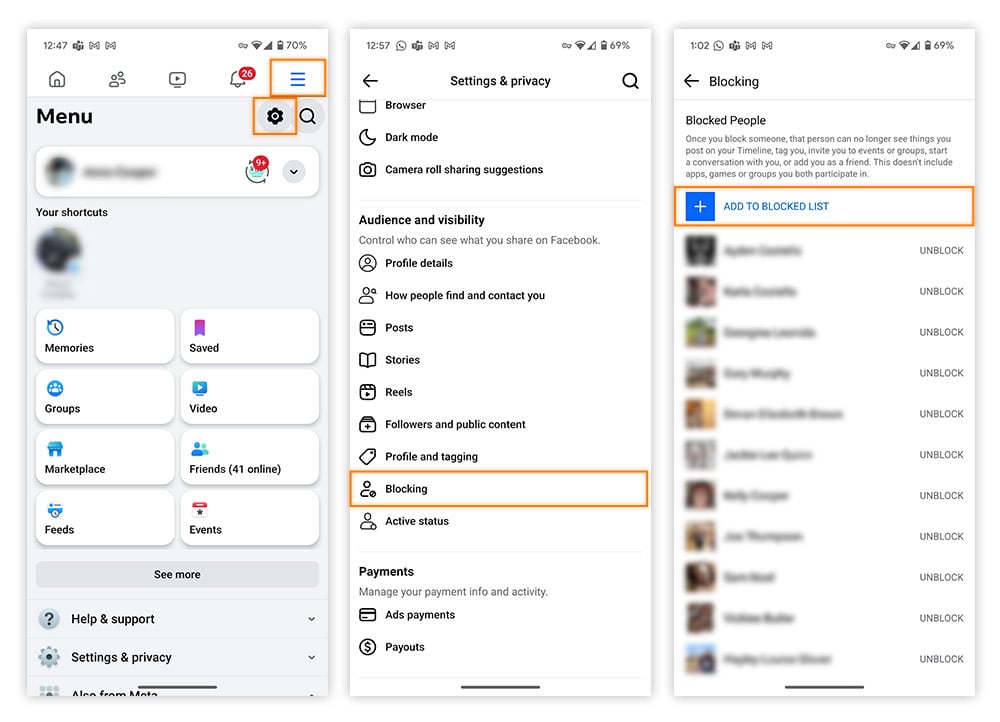
-
Then type the user's profile name into the search bar, tap Block next to the correct profile, then Block again to confirm in the pop-up message, and finally Close.
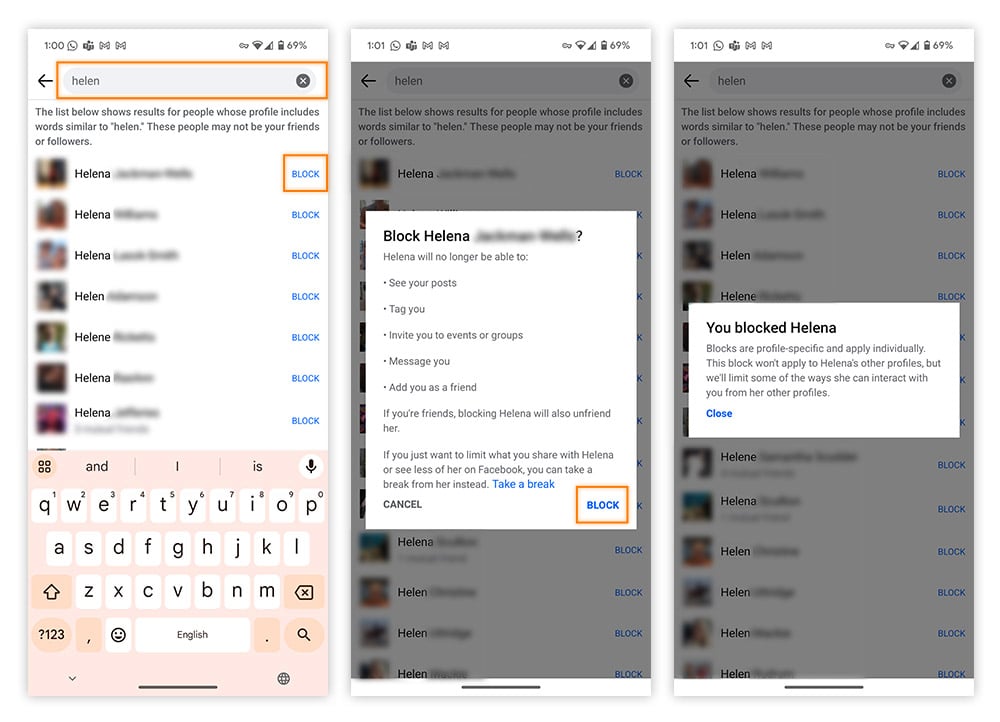
Verify buyers and sellers
Scammers can create compelling Facebook profiles to carry out their fraudulent activities on Marketplace. Luckily, there are some telltale signs that a buyer or seller may be a scammer.
-
Check the profile age: Look out for new accounts that have minimal activity or friends — scammers often use freshly-made profiles to carry out scams.
-
Review user ratings and reviews: Watch out for users with no reviews, low ratings, or overly positive feedback from new accounts. Trustworthy sellers usually have detailed, balanced reviews from a range of users.
-
Verify user profile information: Incomplete or poorly constructed profiles with missing profile pictures and few friends could indicate a low-effort account created solely to be used for scams.
-
Examine the seller's email address: Look up suspicious or incorrect email addresses linked to a seller’s account, such as ones that don’t match their name or the business they claim to be.
Avoid high-pressure buyers or sellers
Buyers or sellers who pressure you to act quickly on Facebook Marketplace may be trying to scam you. Creating a false sense of urgency is a common tactic to cloud your judgment and push you into making costly mistakes.
Be cautious of repeated, pushy messages urging you to close a deal immediately. Take your time, verify the details, and don’t hesitate to walk away — or block the user — if they continue using high-pressure tactics. Your safety and peace of mind come first.
Communicate on Facebook
Scammers often push buyers and sellers to communicate outside Facebook Messenger — through text, email, or third-party apps like WhatsApp or Telegram — to sidestep Facebook’s moderation or other security measures.
Sticking to Facebook Messenger helps protect you in case of disputes by keeping all communications visible to Meta for review. Key benefits of conducting all conversations on-platform include:
-
Facebook’s scam detection: Facebook monitors Marketplace conversations for suspicious activity, flagging potential scams and fraudulent behavior.
-
Easier to report issues to Facebook: Any suspicious conversations on Messenger can be reported as scams and disputes. If you switch to another platform, you lose that paper trail.
-
Linked profiles and ratings: Facebook Messenger is linked to the main Facebook platform and Marketplace, making it easy to check user backgrounds before proceeding with a sale.
Use a scam detection app
Using a scam detection app can help you analyze conversations, listings, and payment requests to identify suspicious activity before you fall victim to fraud. These tools use AI, machine learning, and fraud databases to flag potential scams.
Top-quality security apps like Avast Free Antivirus offer robust scam detection features, like scanning web links in messages to identify potential threats before you open them. It even blocks malicious email attachments, helping to shield your inbox from phishing attempts.
Use secure payment options
Scammers often push for unsafe payment methods like gift cards, payment apps, wire transfers, or cryptocurrency that are difficult to trace and nearly impossible to reverse.
To protect yourself, always use secure payment methods that offer some form of buyer protection. PayPal and Facebook Pay are your best bets; if the item is fake or never arrives, you can file a claim to recover your money. Credit cards may also offer chargeback options, but be sure to review your provider’s policies before making a purchase.
Even for local transactions, avoid paying in cash. If the seller disappears or the item is faulty, you’ll have no recourse. Stick to trusted, trackable payment methods to reduce your risk.
Pay after receiving local items in person
Withholding payment until you’ve received the item can help protect you from scammers who demand upfront payments for goods that never arrive or don’t match the listing. While some legitimate sellers may be hesitant to ship without payment, local sellers can be encouraged to meet in person for a secure, simultaneous exchange, giving you a chance to inspect the item before handing over any money.
For non-local purchases, use a secure service like PayPal that holds the payment in escrow until you confirm the item was received as described. If something goes wrong, you can dispute the transaction, and PayPal may refund your money instead of releasing it to the seller.
Meet in a secure, public location
When meeting a local buyer or seller in person, always choose a safe, public location, like a busy café or store parking lot, to reduce the risk of scams, theft, or personal harm. Avoid secluded spots, private homes, late-night meetups, or sudden location changes, which can increase safety risks.
Set fraud alerts
Enabling fraud alerts across your bank, credit cards, payment apps, and Facebook can help you quickly detect and stop unauthorized transactions, no matter which payment method you use. Most banks and credit card providers let you set up alerts for suspicious activity, chargebacks, or unapproved transactions.
If you use Meta Pay (previously called Facebook Pay) to send or receive money, their protection policy automatically reviews your account for unauthorized transactions or account takeovers. For added protection, consider using a credit monitoring service to receive alerts if new credit accounts are opened in your name.
Upgrade your online security
Using security software like Avast Free Antivirus can enhance your protection against online scams by helping to detect phishing attempts, block malicious links, and safeguard your personal information from scammers.
Whether you're browsing Facebook Marketplace on your phone or computer, real-time protection from a reliable security app can identify unsafe websites and flag suspicious links, reducing your risk of falling victim to fraud or malware.
Act with caution
Scammers often rely on tactics like unrealistically low prices, dramatic backstories, or convincing stock photos to make their listings appear legitimate. These tricks are designed to lure you in and lower your guard. If something feels off, the details don’t add up, or the deal seems too good to be true, trust your instincts — proceed with caution or walk away entirely.
I got scammed on Facebook Marketplace, what can I do?
If you’ve received a faulty item or something that doesn’t match the description on Facebook Marketplace, reach out to the seller immediately through Facebook Messenger. This direct line of communication may help resolve the issue or reveal signs of a scam.
Suspect you’ve been scammed? Act quickly: report the scam to Facebook, secure your account, and take steps to protect your finances and personal information. Prompt action increases your chances of recovering funds and preventing further damage.
Here’s what to do if you think you've been scammed on Facebook Marketplace:
-
Report the buyer or seller: Alert Facebook of the misconduct by reporting the user via their Marketplace profile.
-
Report the listing: If you notice the scam listing is still active, report the listing by tapping the three-dot menu to the right of the Share button and choosing Report listing.
-
Block the user: If you think you’re dealing with a scam on Facebook Messenger, stop communicating with them and block the individual.
-
Contact law enforcement: Alert the authorities of the crime and notify the FTC for consumer protection and guidance. If possible, provide screenshots of your communications, the scammer’s profile, and their listing for evidence.
-
Inform your payment provider: Whether you paid via PayPal or a wire transfer, ensure you inform your payment provider, as they may be able to help get your money back.
-
Notify the credit bureaus: Consider freezing your credit by contacting the credit bureaus — Experian, Equifax, and TransUnion — to protect yourself from potential identity theft and unauthorized financial activity.
Boost your online safety with Avast
Shopping or selling online? Protect yourself with Avast Free Antivirus — a powerful, easy-to-use tool that automatically detects and blocks phishing scams before they reach you. With real-time protection, automatic updates, and advanced malware defense, Avast helps keep your personal data safe and your device secure every time you go online. Download it for free today.



















